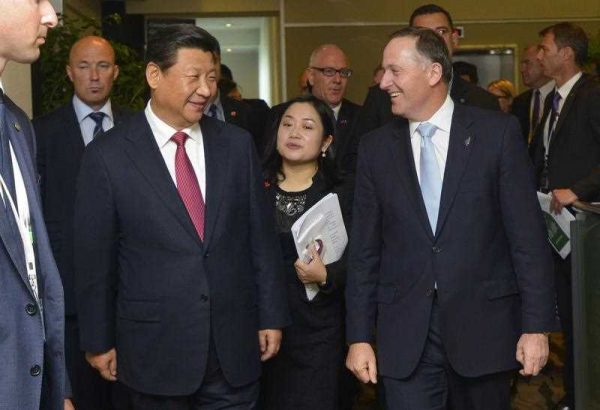The AIIB presents an opportunity for New Zealand to amplify its impact in the region. Though not a member of the AIIB, New Zealand is in a prime position to help manage future Pacific projects that attract AIIB backing. New Zealand’s small size and relative lack of geopolitical alignment allow it to pursue partnerships with both the US and China, while experience working in the Pacific makes its input on projects valuable.
At its core, the establishment of the AIIB is a product of China’s dissatisfaction with existing US-dominated development finance institutions. China’s share of the vote in the Asian Development Bank (6.47 per cent) and the World Bank (5.17 per cent) does not reflect its economic power. Current levels of lending by the ADB and the World Bank fall far short of meeting the region’s acute demand for infrastructure investment. Loans from these institutions are also burdened by extensive transparency and good governance requirements.
China, on the other hand, has an interest in promoting a set of development norms based on political non-interference. China also stands to gain favour with its neighbours if its investment model can successfully spur regional development.
China has made large commitments to the New Development Bank (NDB) and the AIIB. So far China has taken responsibility for supplying around 40 per cent of the NDB’s US$100 billion contingency fund, more than twice the amount put forward by the other members, and half the AIIB’s initial US$100 billion capital fund.
The suspicion with which some view China’s expansion into multilateral development finance is unwarranted. While Beijing is attempting to increase China’s influence in the Asia Pacific, its actions amount to economic and political common sense. China has previously been criticised for being a passive power and demonstrating lacklustre leadership on international issues. Its significant capital reserves must be mobilised if the region’s infrastructure needs are to be met.
China wants to increase regional prosperity, boost its global leadership credentials, procure financial wins for Chinese state-owned enterprises and secure votes in organisations like the UN. China therefore has strong incentives to act as a responsible power.
Until recently, China has been averse to pooling its aid money with others for fear of losing autonomy. In 2012 it turned down an invitation from Australia to join the Cairns Compact to promote transparency in aid flows in the Pacific. A senior Chinese delegate Wang Yongqiu said, ‘We have different approaches and practices from Western developed countries. We feel it is unnecessary to accept this multilateral coordination mechanism, but we need time to study it’.
Now that China has established multilateral coordination mechanisms of its own, New Zealand should seek ways to contribute to the AIIB’s success, at least where the Pacific is concerned. The lack of involvement by other Western countries in the AIIB should not deter New Zealand. Indeed, New Zealand has a track record of firsts when it comes to China. New Zealand was the first developed country to sign a free trade agreement with China in 2008. It was also the first developed country to announce a trilateral development project with China in the Asia Pacific, with a NZ$50 million (US$38.5 million) project to improve water quality in the Cook Islands in 2012.
Of course, successful collaboration depends on clear-eyed risk assessment. Internationally, New Zealand has an iconic brand built around its reputation as a fair, independent, green and safe country. Threats to this brand are taken very seriously, with the memory of the 2008 Sanlu milk scandal still raw in the New Zealand political and business psyche. New Zealand must therefore be selective in the projects it chooses to become involved in.
Another risk for New Zealand is whether China–New Zealand development cooperation might inadvertently cool New Zealand’s recently strengthened security relationship with the US. In 2010, the Wellington Declaration was signed, symbolically patching the rift caused in 1984 by New Zealand’s anti-nuclear policy. Following the signing, the former US secretary of state, Hillary Clinton, described the US–New Zealand relationship as ‘stronger and more productive than it has been in 25 years’. Ironically, US appetite to re-engage with its traditional allies in the region is partly motivated by a desire to reinforce its sphere of influence in the face of a rising China.
Whether it is worth stepping back from this progress with the US to pursue opportunities created by the AIIB will depend on how willing New Zealand is to use the full policy space available and engage independently with its partners.
A successful New Zealand foreign policy depends on working with all significant powers in the Asia Pacific. A reliance on the economic goodwill of China and on informal security relations with its traditional partners means that New Zealand must walk a tightrope between the two. Remaining flexible and agile will be key to ensuring that New Zealand benefits from a rising China, while being able to advance Pacific development and the credibility of its independent brand.
Cassandra Shih is a recent graduate from the Victoria University of Wellington.
Benedict Xu-Holland is a student and Education Officer at the College of Arts and Social Sciences, the Australian National University.


I am trying to reconcile the problem I have in reading the following two sentences from the article:
“…Australia would join, but it eventually withdrew, citing ongoing transparency concerns…”
and
“The suspicion with which some view China’s expansion into multilateral development finance is unwarranted.”
If China refuses to meet international standards of accounting, then of course it warrants suspicion. The issue should then focus on the question as to why China isn’t transparent, and not whether or not other countries should accept participation in this organization.